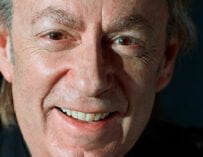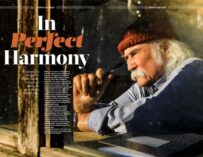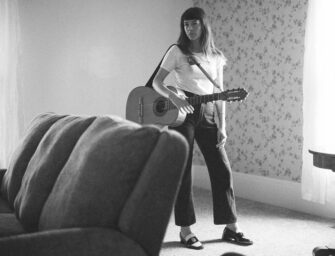
Lighthouse Family’s Paul Tucker [left]: “Once you get a little crack you’ve got your foothold…”
Finally returning with a new album, we catch up with the pop-soul duo’s songwriter still searching for his Holy Grail
The Lighthouse Family’s soulful and uplifting pop music was an almost constant presence on the UK charts of the mid-90s. A classic singles band, the duo of Tunde Baiyewu [who we also interviewed way back in 2013] and Paul Tucker managed to hold their own in a British music scene dominated by boy/girl bands and Britpop. Releases such as Lifted, Raincloud and High not only made the UK Top 10 back in the day but continue to get regular airplay in 2019; proof of the effective fusion that is Tucker’s melody-driven songwriting and Baiyewu’s instantly recognisable voice.
Having split after 2001’s Whatever Gets You Through The Day, the duo’s first reunion in 2010 didn’t spawn any new material. Thankfully the pair preserved and are soon to return with the record, Blue Sky In Your Head and judging by its lead single, My Salvation, they still know how to brighten up the musical landscape. As well as an album of new material, Baiyewu and Tucker are spoiling fans with Essentials – 10 classic Lighthouse Family songs remastered for the very first time.
With so much to catch up on, we recently sat down with Paul Tucker…
What changed between your original reunion in 2010 and now which meant you were able to write and record a new album together?
“We’re older and wiser. It was different this time, it still wasn’t easy but there was more of a will to make it work. It still had all the same challenges that it had in 2010 but it was just a case of the determination to make it work and not to let it go.”
Were those challenges of a personal or professional nature?
“I think the thing is, with Tunde and I, we do different things and if we both do what we’re best at then it really, really works. If we’re not playing to our strengths it doesn’t work. It’s as simple as that really.”
So do you both have specific roles to play in the writing process?
“Take Ocean Drive, for example, I wrote that song. High, I pretty much wrote that; Lost In Space, I wrote that. As a rough rule, I would write the chord progression, unless I was writing with somebody else who brought a chord progression. I often write the melody, though Tunde has got a fantastic melodic sensibility, it’s amazing. High, for example, the melody and the bridge is Tunde’s, but by and large, I write all of the lyrics. There are a couple of tracks on this album where Tunde has written the lyrics for, Under Your Wings and Put My Heart On You, they’re his songs. But my thing is lyrics and progression. Progressions are really important to me, and structure as well.”
Are you hearing Tunde’s voice when you’re writing lyrics?
“Absolutely that. I know what Tunde’s voice does, I know where his sweet spot is and I know what is true for him. There is some stuff which he would just never sing, so it’s really important that it’s real and true for him. I have to get inside his skin a bit to do it.”
Does that mean you’re not always together when you’re writing?
“Take Live Again: Tunde and I went into a room and put a progression together. On that particular song, I worked on the chorus melody and Tunde worked on the verse melody. I then took it away and listened to it and could hear the emotion in it. It then took me about four or five days in a room on my own with a blank sheet of paper to chisel out what that melody was saying. What is that vocal melody’s story, what is it telling me?
“Actually it’s pretty soul-destroying work. Same with Blue Sky In Your Head. In fact most of the songs on this record, weeks of a blank sheet of paper trying to bring the story of the song and the music to life.”
Are there things that you can do to aid that process?
“A lot of the time you get to a point where you’re just doing your own head in. Like I said, it’s quite soul-destroying. For Blue Sky In Your Head, I was sitting there for days. It was one of the first songs we did for this record and I was asking whether I could still do it, I was doubting it. ‘Can you still actually do this?’ I think that’s actually a vital component, that doubt. ‘That’s not good enough, that’s crap.’ You keep discarding things. ‘Throw that out, that’s not true,’ just throwing everything away. Sometimes, instead of one blank sheet of paper, I’ll have 20 or 30 sheets of paper with scribbles on, and it’s all rubbish, before I get to something good.
“But then, take Blue Sky In Your Head again… I was in the studio in Newcastle, which isn’t the best place to write lyrics, but I could be in there and isolate myself. I have to be on my own. I actually wrote, ‘I don’t know what I’m doing, wish I was somewhere else instead. Cos I can picture life with you, I’ve got blue sky in my head.’ I was looking out the window at Newcastle and it’s grey like it is today. As soon as I got to that I thought, ‘Hold on, I love this idea.’ To me, that’s what a Lighthouse Family song should do. It should put a blue sky in your head. Then I ran with that. Once you get a little crack you’ve got your foothold. You understand the story and can morph the rest of it out of that.”

Lighthouse Family’s Paul Tucker [right]: “I don’t take it to Tunde until I think it’s nailed and I’m convinced by it…”
Is it helpful having Tunde as a brother in arms, or is it more daunting because you have someone else relying on your writing?
“I don’t actually bring it out until I think it’s done, not even half done. I don’t take it to Tunde until I think it’s nailed and I’m convinced by it.”
Do you enjoy the process of editing your songs?
“When I’m writing I get it up as quickly as possible. I get the bass down and a drum sound, I don’t want to get bogged down in EQ. As long as it’s working and you’ve created a convincing illusion and the mood is coming to life then I’m happy with. That’s the writing stage, I don’t get bogged down with that stuff I only worry about that when I’m recording. I’m actually very driven, kind of a perfectionist obsessive. Much the same way as Tears For Fears or Talk Talk were in the 80s.”
So is there a temptation to constantly tinker during the recording stage?
“No, not at all. Anybody with a laptop will tell you, you don’t want to pull down that thing where it says ‘instruments’ and have 1000 options drop down. You don’t want too much kit. To me, the gear is just what you use to do it. I think it’s a distraction and in some ways it’s irrelevant. We all love kit, but it doesn’t really write tunes does it?”
At what point did the new songs lead to The Essentials album?
We mastered the new record with John Davis at Metropolis and when making it we knew what we wanted a Lighthouse Record to be. We asked ourselves what would we do if we were making a Lighthouse Family record now, and that’s what we’ve done. The way that he mastered it and cut it is very contemporary and it’s got an energy about it. He was listening to the original masters of the old records and he actually said, ‘Wouldn’t it be great if we could go back and cut those the way that we are doing this,’ so we did.
“I’ve heard Lifted so many times and I almost thought it sounded a bit worn around the edges, but what he’s done is he’s injected a new energy into all those classic tracks and brought them back to life. I think Lifted sounds like a banger again.”
We were surprised that you only made three albums the first time around, perhaps because we still hear so many of your songs on the radio it feels like you have a larger catalogue…
“It’s funny because it’s almost like we disappeared but the songs didn’t. The songs have been out there all that time.”
Why do you think songs like Lifted, Ocean Drive and High have such an enduring appeal?
“You know what, I can’t really answer that. For me, there is a particular kind of song which is my Holy Grail and I’m always trying to write that song. High was that song, Ocean Drive was that song, Lost In Space was that song. I think off the new record, Who’s Gonna Save Me Now is that song, and Clouds, maybe Live Again as well.
“A lot of the songs that I write, particularly High and Ocean Drive, I wrote for myself. When you’re at a low point in your life you can write music that makes you feel better, that gets you through tough situations. That’s what those two songs were, they’re songs that put blue sky in your head. Every time I write a song that’s what I try to do, I try to write a High or an Ocean Drive. You can’t always get there. You always think that you’re getting there at the beginning, some of them become High but then other become Once In A Blue Moon off Postcards From Heaven.”
Is it rewarding to know that those songs might also have a similarly positive effect on the listener?
“The thing is, and Tunde and I both say this a lot of the time, you write songs primarily for yourself. You write music for yourself, music that you love the sound of and then you hope that other people will love it in the same way. You can almost write yourself out of a dark corner if you make a piece of music that helps you feel better. If it works for you then it might work on somebody else as well, I suppose.”
Does that mean success isn’t as important, because you’re writing songs for yourselves?
“That’s an interesting point. When we were going through this process I had the same kind of obsession about what we were doing as I did when we did it in the 90s. It’s probably a nightmare for everybody that lives with us and works with us. High was a killer of a song to write, it was hard. I did exactly the same thing with these songs as I did when I wrote that one. You want it to be as successful as it can possibly be, that’s it. A song like High is a really high bar to achieve but I wondered whether we could still do it. I’ve mentioned songs like Who’s Gonna Save Me Now that I think are those songs. It’s 20 years later and who knows what will happen but, from my point of view, I’m satisfied that I did the same thing and these tunes do that same thing.
It must also be satisfying that having started with a blank sheet of paper you now have a new album?
“It is. That is the thing, it’s part of that Holy Grail.”
Interview: Duncan Haskell
Lighthouse Family’s new album Blue Sky In Your Head will be released on 5 July. For all the latest news and tour dates, head over to thelighthousefamily.co.uk.



































Related Articles